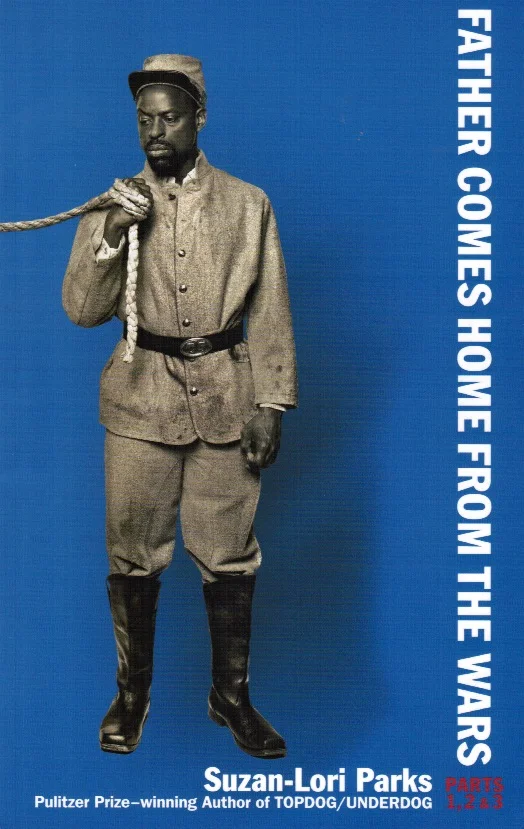Parks. FATHER COMES HOME FROM THE WARS, PARTS 1, 2, & 3.
Parks, Suzan-Lori. Father Comes Home from the Wars, Parts 1, 2, & 3.
Publisher: TCG, 2015.
Premiere: The Public Theatre, NYC, 2014
Part 1: A Measure of a Man
Spring, 1862. A slave cabin in far west Texas
Characters: Musician; Chorus of 4 Less Than Desirable Slaves; Oldest Old Man; Hero, Penny; Homer.
In Part 1, Hero decides to go to the War as Boss-Master-Boss’s slave. At the play’s beginning, the Chorus places bets about whether or not Hero will go. Old Man, Hero’s adoptive father, wants him to go—partly because Boss has promised him his freedom if he goes. But it turns out he was promised freedom before to get him to cut off run-away slave Homer’s foot, so it’s questionable whether or not Boss will keep his promise this time. Penny, Hero’s woman, wants him to stay. But if he does, all will be beaten. Hero’s one-eyed dog Odd-See has run off. Part of the situation is not only the dangers of war and the demeaning work of servitude but also that Hero will be supporting the side of slavery in the War. Hero himself decides first one way and then the other. What finally seems to make up his mind is the revelation that he informed Boss about Homer’s escape in exchange for Boss’s promise of his own freedom, a promise Boss immediately broke. At the end of Part 1, Hero goes to war.
OBSERVATIONS ON PART 1: Part 1 is 50 pages long, roughly a one-hour one-act. It is prefaced by a single song sung by the Musician: “Dark Is the Night.” It is written in free verse. The character names have affinities with Homer’s Odyssey—Homer, Penny (Penelope), Odd-see (≠Odyssey).
Part 2: A Battle in the Wilderness
Late summer, 1862. A wooded area in the South
Characters: Musician; Rebel Colonel (Boss-Master-Boss); Smith, a captive Union soldier; Hero.
Colonel has Smith confined in a wooden cage; Smith is wounded in the leg; Hero is out gathering firewood and water. Smith says Hero won’t come back, but he does. Colonel sets him to making a fire to cook the rabbgits they have. Colonel quizzes Smith about ho many slaves he has; Smith has none. Colonel talks about the glory of beign White. Questioned, Smith reveals that he is Captain of a Kansas Colored Regiment. Cannon fire draws nearer, and Colonel goes to reconnoiter. Hero discovers that Smith is actually a private, not a captain, and that instead of being White, he’s a very light skinned colored man who was freed when his master died. The Colonel comes back and they break camp because the armies are converging. Colonel goes on ahead and leaves Hero to bring Smith along more slowly because of Smith’s wound. Hero sets Smith free. Smith gives him the Union private’s coat which he was wearing under his captain’s coat. Hero puts it on under his Confederate coat.
OBSERVATIONS ON PART 2: Part 2 is 57 pages long and is written in prose. It includes a couple of songs.
Part 3: The Union of my Confederate Parts
Fall, 1863. A slave cabin in far west Texas
Characters: Musician; 3 Runaway Slaves; Homer; Penny; Odyssey (Odd-see) Dog (acted by a human); Ulysses (aka Hero).
3 Runaway Slaves who have been sheltered by Homer & Penny are waiting for dark to continue their escape to freedom. They convince Homer to leave with them. It becomes clear that Penny is carrying Homer’s child. During Part 3, they declare their love for each other. They get word of Master’s death. Odd-see Dog returns and tells of Master’s death. He says “Old-Hero” is alive, although all assume he’s dead. Hero returns having renamed himself Ulysses after U.S. Grant. He gives Homer and Penny gifts that he has brought and then he reveals that Alberta, his new wife, will soon arrive. He expects Penny to stay and help her with her chores, etc. He begins to suspect that Penny and Homer have become lovers, and he tries to kill Homer, but the others stop him. At the end of the play, Homer and Penny leave with the 3 Runaways. Only after they’ve gone does Ulysses reveal the Emancipation Proclamation that frees them all.
OBSERVATIONS ON PART 3: Part 3 is 50 pages long and is written mostly in prose with occasional passages in free verse. It’s prefaced with the song “Misplaced Myself.”
OBSERVATIONS ON THE ENTIRE CYCLE
The play has an epic, archaic, mythic feeling. One contribution to this effect is the rather flat, simple, and repetitive dialogue written largely in a modern idiom with some hints of African-American dialect.
The names with their allusions to Homer’s Odyssey also contribute to this effect as well as the hints of connections to the Odyssey’s events—a warrior returning from battle, etc.
Any number of plot turns seemingly come out of the blue—as in Ulysses’ introduction of Alberta, Odd-see’s unexpected return, Smith’s revelation ofhis true identity, etc.
All of this serves to give a kind of mythic impact to this very simple story of a civil war event.
The songs were written and composed by Parks.

